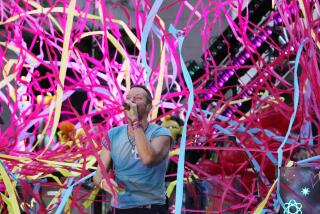Fans, Not Albums, Carve Niche for Depeche Mode
- Share via
SAN DIEGO — Over the years, Depeche Mode has probably broken more attendance records than it has sold records.
The British synth-pop band has become this year’s biggest concert attraction in the country, even though until recently they’ve never had much success on the U.S. charts--which generally is what precipitates huge live draws.
For Depeche Mode, the trend isn’t new. Two years ago, the band easily sold out the 75,000-capacity Rose Bowl in Pasadena. At the time, it had only one Top 40 hit to its credit, “People Are People,” which had peaked at No. 13 on Billboard’s Hot 100 singles chart in July, 1985.
This month, Depeche Mode becomes only the second pop act in San Diego Sports Arena history to play three nights at the 12,000-seat venue. Neil Diamond did three shows in 1987.
By the time “Violator” and “Enjoy the Silence” recently
became the group’s first-ever Top 10 album and single, respectively, the first two shows--tonight and Sunday--had already sold out, prompting the addition of a third date Tuesday.
Depeche Mode plays simple, innocuous dance music with an infectious, though not overpowering, synthesized beat. The band’s rhythms and melodies are as stark and brooding as the lyrics, which address such topics as love and growing pains from the standpoint of teen angst.
Part of the band’s initial live appeal was its fashionable look and image. The name Depeche Mode is French for “up-to-the-minute fashion”--and, although the four members have since grown out of their frilly “New Romantic” stage, their live shows are as opulent as ever.
The price of a ticket gets you nearly three hours of throbbing, nonstop dance music, with plenty of smoke machines, flashing lights, dancing and special effects--including bits of movies projected onto a pair of wide screens flanking the stage. It’s sort of like being in the world’s biggest, splashiest disco, only the action takes place on stage rather than on the dance floor.
Depeche Mode’s unusual rise from box-office star to chart sensation is not unprecedented.
“If you look at U2 and, to a degree, INXS, the same thing happened,” veteran San Diego concert promoter Bill Silva said. He is producing the three Depeche Mode shows at the Sports Arena.
“They became superstars on the basis of their live shows; they made their concerts such incredible experiences that their fans would run home, grab a couple of friends, and say, ‘You’ve got to see their next show with me.’ ”
Since the group’s emergence from the London pub scene in 1981, when they signed with a tiny independent U.K. label, its concerts have been as studio-perfect as their records--thanks to the truckload of computers, drum machines, samplers, sequencers and other high-tech accouterments hauled up on stage.
“One of the biggest mistakes we’ve ever made was when we first booked them into the Sports Arena in 1984,” Silva said. “Their agency wanted us to go with the whole arena, and we thought they were crazy--so we convinced them to do the amphitheater configuration, with only 5,200 seats.
“When we all but sold out the first hour, we belatedly realized that we could have sold a lot more, that we had really underestimated their draw.
“I still remember when the band arrived at the arena--they were looking around the place, cut down as it was, and looking at us like, ‘Didn’t you believe in us?’ ”
Two years later, Silva said, he brought Depeche Mode back to the Sports Arena--this time to the full arena--and the show quickly sold out. So did the band’s full-arena encore in 1988.
“So this year, when we decided to bring them back a third time, we were the ones who were pushing for more,” Silva said.
“We told them we wanted three nights, but they wanted to be conservative and do only two. Only after those two shows had sold out did they agree to do a third show, and, even then, it took a lot of pushing and cajoling.”
Tickets to Tuesday’s concert went on sale last Saturday at 10 a.m., and by the time the box office closed for the day, 5,700 tickets--almost half--had already sold.
“Since then, we’ve been averaging about 400 tickets per day,” Silva said.
More to Read
The biggest entertainment stories
Get our big stories about Hollywood, film, television, music, arts, culture and more right in your inbox as soon as they publish.
You may occasionally receive promotional content from the Los Angeles Times.







